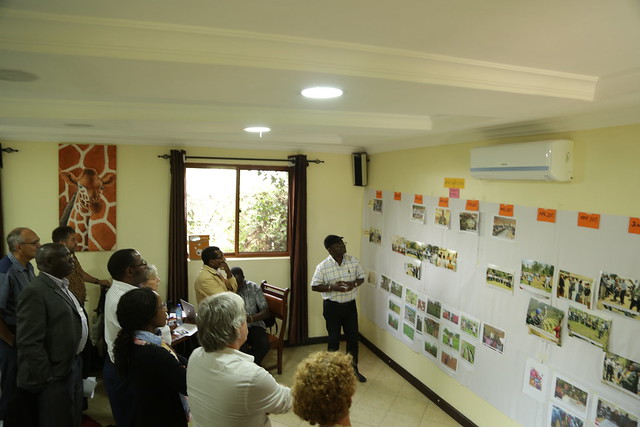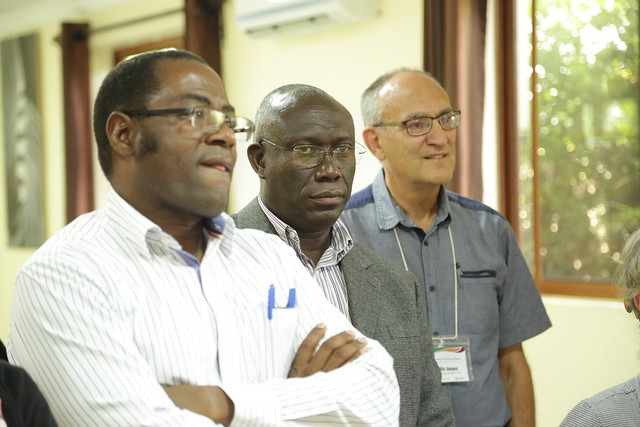Advisory group re-formed to spearhead science for development in Africa RISING
Warning: Trying to access array offset on value of type bool in /home/africarising/public_html/wp-content/plugins/slideshare/slideshare.php on line 162
Warning: Trying to access array offset on value of type bool in /home/africarising/public_html/wp-content/plugins/slideshare/slideshare.php on line 165
A complex agricultural research program like Africa RISING needs the help of a dedicated team in keeping it ‘on the right track’ towards its goal of improving food, nutrition, and income security of smallholder families. This is especially critical because the program, now in its second phase, is seeking to strike the balance between science and development.
The newly-formed Science Advisory Group (SAG) started playing this counseling role in a meeting, held 22-23 June 2017 in Arusha, Tanzania. The meeting brought together the SAG members, most of the program coordination team (PCT), the three project chief scientists and ‘champions’ of four Africa RISING communities of practice (CoPs).

The program SAG was initially set up in phase I of Africa RISING. It has now been revived in this second phase of the program (which was officially launched last January, also in Tanzania), to make it a functional guiding mechanism for the program. Six newly appointed members form the SAG:
- Moses Tenywa, Makerere University, Uganda
- Colettah Chisike, Zimbabwe
- Jim Ellis-Jones, UK
- Eva Weltzien-Rattunde, University of Wisconsin-Madison, USA
- Nancy McCarthy, LEAD Analytics, Inc. USA
- Brigitte Maass, independent consultant, Germany
All but Colletah Chitsike met for the first time in Arusha, Tanzania, to inaugurate the group and to meet with program staff including members of the program coordination team (PCT) as well as the champions of four out of seven recently-formed CoPs. The event brought together 20 participants.
This meeting focused on addressing the information needs of SAG members, program elements (including differences between Phase I and Phase II) and monitoring and evaluation. The CoPs each SAG member will be advising and contributing to were identified. Each of three groups (SAG, PCT and CoP champions) also met separately.
Understanding impacts
During the meeting, participants agreed on how to distinguish ‘reach’, ‘use’, ‘adoption’, and ‘impact’ in reporting project results. Among the topics discussed was what ‘scaling a technology’ means and how Africa RISING (and others) can better understand the impact of their technologies among farmers.
Haroon Sseguya, from the International Institute for Tropical Agriculture (IITA), who is the champion of the scaling CoP on ‘research outputs to scaled innovations’, introduced the topic with this presentation:
Participants concluded that:
- Socio economists in the program need to further define these terms (based on existing donor meanings) and explain the relationships between them.
- Reach is part of standard monitoring and evaluation and it needs to also include ‘adoption’ etc.
- The wide diversity of innovations in Africa RISING should include how farmers are testing our technologies in the longer run.
- A sweet spot for Africa RISING includes routinely collecting information on indirect adoption and testing, and on direct testing and on non-compliance.
They suggested that further discussions on the subject be done in the scaling CoP.
Outcomes of team meetings
All three teams in the meeting shared the outcomes of their deliberations.
The program coordination team reported on the need to have clear publishing guidelines in the contracts of scientists; the importance of moving forward with the CoPs and to report progress in next PCT meeting in September; the decision to move forward with finalizing a Phase I summary document that should be ready by September. They also shared feedback on some plans regarding cross-regional exchange visits around specific themes; the hosting of the annual program learning event in 2018 Q1 in Ghana; and the support given to the two ‘bottom-up’ CoPs on watershed/landscape management and on virtual farming.
The CoP champions reported that the CoPs were off to a slow but good start and gave the following among other recommendations: having a two-tier membership structure with a core group and an active group with all other members; they suggested some certain individuals should join specific CoPs and they requested PCT support in getting everyone to sign up to the CoPs. A virtual meeting of all CoPs members and a face-to-face learning event are planned in future.

The meeting closed after feedback from the science advisory group members which reported that.
- Jim Ellis-Jones was chosen as the chair (to work closely with the PCT chair Bernard van Lauwe).
- The SAG priorities will include moving from Phase I to Phase II, harmonization, scaling and synthesis of lessons learnt.
- Scaling up, communication and capacity building are interlinked;
- Platforms have a crucial role to play, especially if they connect from local to national level–and it would be great to look at them in the formal M&E approach of Africa RISING.
- The SAG members will each be keeping oversight of a specific CoP (with another SAG member actually backing up)–except for virtual farming;
- The SAG will communicate with the rest of the program through CoP interactions, regular Skype discussions and direct involvement in the learning events.
The next meeting of the three team is scheduled at the annual program learning event in March 2018.
Read all the meeting notes
See pictures of the meeting




